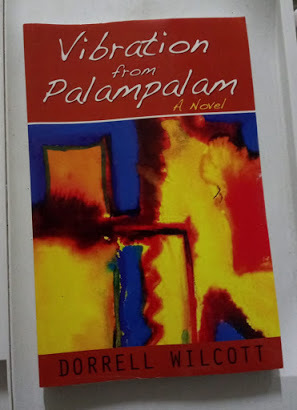Vibration from Palampalam - A Young Man Makes Life In Jamaica
 The beauty of an allegorical story is that it is open to interpretation, you fill in the blanks or undo the mysticism to get to the real point of the story.
The beauty of an allegorical story is that it is open to interpretation, you fill in the blanks or undo the mysticism to get to the real point of the story. The Vibration from Palampalam A Novel by Dorrel Wilcott published by Arawak publications in 2012, leaves me with the impression that although this book is not an allegory, the author is deliberately misleading by skipping over much that should be important to the story and expending energy on smaller things.
The book tells the story in the fine old way describing a version of the life arc of the protagonist, and gives us information on his ancestors and also his progeny. It would seem therefore, that the modest 142 pages would give us a good grounding of the character, but there is still so much more that was not told. It was not a written as a hagiography, as the failings of the character are set out, but it feels like an incomplete memoir of a man.
The foreword by Patrick Bryan is helpful in explaining the hero Dalphus Congonza when he says, "First, his ambition is to throw off the scars and the negative features of that childhood, and to succeed in spite of them. Second, and in contraction, some of the values that he disdains and which contributed to the disfunctionality of his family became a part of his own value system."
The novel is not preoccupied with race and colour. However, they both have an enormous inflience in shaping the lives of people and contributing to the dysfunction within the Dalphus' family," Bryan says, this should have really read the Congoza family.
Dalphus grew up with minimal education in Palampalam iwhich was supposed to be a frightfully haunted woodland within the community of Service. He was the only child in a family where there was no love. Even though Dalphus hurt his mother early on, it was a reaction to the "who had seen everything that she disliked about her husband in that little boy".
The natural environment of rural Jamaica is integrated into the book from beginning to end. Dense woodland had to be cleared to build both the home that he grew up in, and a rocky hilltop had to be cut to build the prominent home that he made for himself. The woodland was the scene that led to the death of his friend and deepest grief. Dalphus also made his living from farming the land, and a lot of it was rocky hillside, but he did it successfully and managed to pass down the love of farming to one of his sons.
Relationships between the character and the women in his life are complicated, chief among these women are his mother, wife, lover and elder daughter. He knows that he is not excelling in the relationships, but he seems as if he is helpless in how to improve them and relies on his good friend Gus to play the role of conciliator and way-maker.
When he was just about out of his teens, a woman, Primela admires him in the club and "he declined, almost becoming flustered", then "he looked at her again. The chemistry or whatever they used to call it mixed furiously." Later, he leaves Primela for Emma and their relationship is described as a financial arrangement, "Dalphus had hitched a fee simple in Emma's financial empire."
Later, his mother-in-law is banned from his home for her cattiness and his eldest daughter, the apple of his eye, disappoints when she does not marry as he wants.
Dalphus' relationships with men seem steady and true and valuable, aside from Bandy-Leg who tried to take sexual advantage of him as a naive teenager. Gus became a lifelong confidante, and wise counsellor for both himself and his wife, the beautiful, educated and unworldly Odagled who defied her family to marry him.
As a businessman, Dalphus understands and is not held down by the prejudices that were against him. This included established religion, the police force, financial institutions and even his neighbours at Rico's Bar. He rises above those challenging situations and masters them. He also, somehow, becomes reconciled with his father, but did not with this mother.
Here we arrive at the rock bottom of all of the story of Dalphus: the lack of a loving relationship with his mother Tantal, that experience, left him, he accepted, stone dead to sensitivity in family and intimate relationships. By the end of the book, however, he is grateful to have shared loving moments with his wife and to have experienced love with his children. His children, however, were not a united family, each one deciding to be set against the ways of the others. Dalphus did nothing to heal the rift between the siblings, and participated in it by making it obvious that Daphnie was his "chosen one".
The choice of matters the Wilcott chose to spend his time on were diverse. He set out the matters around the death of Gus in excruciating detail, yet the three marriages in the book were glossed over, or became commentaries on society in general. Additionally, reverence was paid to the very existence of Marcus Garvey who influenced Dalphus' father's thinking and actions. He lets us know that Dalphus is distressed that descendants of Africans enslaved in the Americas had not built on the successes of the Haitian revolution.
It is a theory of mine that stories of relationships with the protagonist and his or her mother defines many contemporary books by Jamaicans. This book fits into that category. In this book, the crime of Tantal was just that she existed and married Ciezo Congoza, a man who neglected her for more stimulating company, and also beat her if he felt threatened by her arguments. Tantal married a dark skinned follower of the teachings of Marcus Garvey, she was a light skinned Jamaican who was the child of a light skinned, snobbish woman.
Dalphus was the victim of his mother's frustration about her husband and she also inculcated prejudices in him, nurturing behaviour that would suggest that he was better than and different from the other children in Service.
Many ideas are not fully set out in the story leaving them open to interpret the true weight that they have on the protagonist, or not. Readers will find it interesting to meander with Dalphus through his life in a Jamaica of once upon a time, but perhaps, still here with us.
END
More discussion on mothers in books by Jamaicans
`



